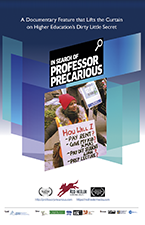
By Chantal Sundaram
Gerry Potter worked as a contract professor for 27 years, at three different institutions, beloved by his students but stymied and exploited by a system that is happy to chew up talented and educated people and spit them out.
The film “Professor Precarious” starts with Gerry’s story of hitting the road, camera in tow, to document the story of so many other contract academics who have shared the same fate across the country.
What they share most, other than precarity, is that they are the invisible amongst those presumed privileged by the Ivory Tower. Even the increasingly visible corporatization of universities and colleges still hides the reliance on casual contract labour with no job security, let alone a living wage or pension.
I once helped in a union drive of contract faculty, and to find potential members to sign cards we tracked down all those listed as “TBA” (To Be Announced) in the course listing. As the opening of the film states, the terms that refer to these jobs are multiple and mysterious to students and the public: sessional, adjunct, contract faculty, contingent, “part-time.”
This is what Professor Precarious is about. It is also about who is to blame.
Exploitation
The film does not shy away from the difficulties of building real solidarity between regular and precarious faculty within academic staff unions. But it also lands squarely on who is really to blame, and how to take them on.
The film cites that the President of UAlberta earns 1.2 million a year while 45% of precarious academic staff earn $20,000. The lack of job security even for that low income is witnessed most starkly by one long-serving academic who attested: “I have reapplied for my job 70 times.”
The beginning of the film focuses on the passion for teaching, why people do what they do despite being undervalued, from scientific fieldwork to theatre and dance. When they are lucky enough to be renewed, sometimes over and over for years, it is still one semester at a time, without any of the security that should come with the value extracted from their work — which generates tuition fees and government grants and ultimately benefits private employers with the quality education they provide.
This film tells several tragic stories of individual human consequences of this unjust system. But it also points to a potential way out.
Collective action
The province-wide strike in Ontario colleges in 2017 put precarity front and centre, and received huge support from students and the public, and this film captures the experience. As Pam Johnson, contract faculty, organizer and picket captain, says in the film: “I’m so inspired by my colleagues who are standing up for better education and better working conditions for contract faculty.”
Sylvain Marois, a contract academic at Laval and union organizer, talks about how Quebec got some of the best collective agreements for contract faculty, both for pay and recognition of activity beyond teaching. They organized a “plan of battle” over time that includes coordinated bargaining with all employee groups in the PSE sector: “Alone you might go faster, but together you will go farther.”
Another story of success comes from Vancouver Community College, which bridged the pay gap between permanent and precarious employees with a union model of a pro-rata pay grid.
JP Hornick, one of the leaders of the Ontario college strike, and permanent faculty member, argues why casualization must be an issue for those lucky enough to have job security: “If this is allowed to continue unchecked… then we will all soon be precarious faculty.”
The film is a useful tool for organizing in the post-secondary sector, but also for anyone trying to understand and challenge the hidden casualization of post-secondary education.
The trailer can be viewed here: vimeo.com/441439656
__________________________________
Chantal Sundaram is a Collective Bargaining Officer at CAUT.
This editorial was first published September 8, 2020 in the Socialist, www.socialist.ca.